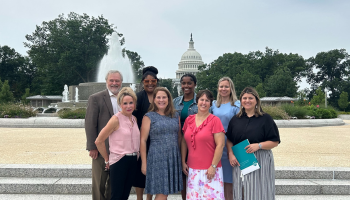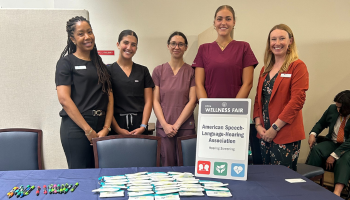ASHA Advocate: July 26, 2024
July 26, 2024
GAPP Board Drafts 2025 Advocacy Priorities and Takes to the Hill
 The Government Affairs and Public Policy (GAPP) Board is in town drafting the 2025 Public Policy Agenda. They are reviewing all of the comments and input submitted by members to help lay the foundation for ASHA’s advocacy priorities for next year.
The Government Affairs and Public Policy (GAPP) Board is in town drafting the 2025 Public Policy Agenda. They are reviewing all of the comments and input submitted by members to help lay the foundation for ASHA’s advocacy priorities for next year.
Yesterday, several GAPP Board members spent the day on Capitol Hill meeting with lawmakers and congressional staff about a wide variety of issues important to audiologists and SLPs. Visit ASHA’s Take Action page to join their call.
CMS Proposes 2025 Payment Policies for Outpatient Services
The Centers for Medicare & Medicaid Services (CMS) released its proposed 2025 payment policies that highlight the need for continued congressional action in 2024. The 2025 Medicare Physician Fee Schedule has several updates that will impact audiologists and SLPs, including a proposed 2.8% payment cut, which could grow to nearly 9% when combined with multiple other budget control mechanisms that Congress controls. CMS has also opted not to add audiology and speech-language pathology related services to the permanent telehealth list. Learn more about the key provisions in the proposed rule and ask Congress to act here.
Medicare Announces 2025 Proposed Payment Policies for Outpatient Hospital Departments
CMS also issued the outpatient prospective payment system (OPPS) rule for 2025, which proposes hospital outpatient departments receive a 2.6% payment update among other items. One of the key issues in the rule is CMS’s proposal to align rules related to telehealth services with those in the physician fee schedule. Other items of interest include quality reporting, prior authorization, and the cost of personal protective equipment. Learn more about the proposed rule and ask Congress to make audiologists and SLPs permanent telehealth providers here.
Rhode Island Becomes 33rd State to Join Interstate Compact
Rhode Island’s governor signed legislation making Rhode Island part of the Audiology and Speech-Language Pathology Interstate Compact (ASLP-IC). The interstate compact will be operationalized in 2025. See the ASLP-IC website for updates on its progress.
Outpatient Medicaid Services Are Being Denied as a Result of School-Based Services
In spring 2023, the Department of Education released a proposed rule that would remove the requirement for public agencies, like schools, to obtain parental consent prior to accessing for the first time a child's public benefits or insurance (e.g., Medicaid, Children's Health Insurance Program (CHIP)) to provide or pay for required IDEA Part B services. Given extensive feedback from many stakeholders, including ASHA [PDF], the Department put the rule on hold while it addresses the many issues the opposing comments made.
ASHA has heard from members that Medicaid services are often denied when school-based services are offered on the same day or even just to the same child whose Medicaid insurance is billed across multiple settings. If you work in the outpatient setting and have experienced Medicaid denials of covered services based on services supplied in the schools that are also billed to Medicaid, please share your experiences here to help us collect important data.
ASHA Highlights Professions in Congressional Resolution
Advocacy win! ASHA helped shape a resolution that U.S. Representatives Mike Lawler (R-NY) and Josh Gottheimer (D-NJ) introduced to support efforts for raising awareness about dyspraxia. ASHA President Tena McNamara was quoted in the sponsors’ press release on the resolution, noting ASHA’s support for “efforts to improve coverage and reimbursement for services provided by audiologists and speech-language pathologists that facilitate early diagnosis and interventions for conditions like dyspraxia that may adversely impact communication.”
Working for You
- Met with the Government Accountability Office to provide input on the congressionally mandated study [PDF] required by the 2022 reauthorization of the Early Hearing Detection and Intervention Act. ASHA emphasized the need for additional program resources to better support state efforts to facilitate diagnosis and treatment for newborns screened for hearing loss.
- Created a resource to help employees and employers navigate the upcoming federal ban on noncompete agreements. We encourage all of those potentially impacted to have a plan prior to the effective date of September 4, 2024, regardless of pending challenges to the ban.
- Signed a letter circulated by the Patient Access to Responsible Care Alliance, of which ASHA is a member, to several federal agencies asking them to promote overdue regulations to prevent insurers from discriminating against nonphysician providers.
- Submitted testimony [PDF] to the U.S. House Committee on Ways and Means Subcommittee on Health for a hearing on value-based care (VBC). The letter highlighted how problems with current VBC and alternative payment models prevent audiologists and SLPs from meaningfully benefiting from the quality care they provide.
- Sent a letter [PDF] to Anthem Connecticut following the announcement of a payment structure change that would impact SLPs, occupational therapists, and physical therapists. ASHA has resources for SLPs who are Anthem CT providers, including a template letter to your provider manager, to help you navigate this issue.
- Sent a letter [PDF] to the U.S. House Committee on Appropriations opposing a provision of the fiscal year 2025 bill to fund the Departments of Health and Human Services and Education that would prohibit funds from being used to provide any services related to gender transitioning, which could prevent reimbursement for gender-affirming voice therapy.
- Met with House Democratic Leader Hakeem Jeffries to discuss health care issues for ASHA members and the remainder of the congressional year.
- Signed a letter [PDF] requesting that the U.S. Department of Homeland Security (DHS) add “rehabilitative sciences” to a list of academic fields of study codes that DHS considers to be science, technology, engineering or mathematics (STEM) fields of study for purposes of the 24-month STEM optional practical training extension. ASHA sent a letter to DHS advocating for the addition of CSD-specific codes last year, and we have renewed our request to DHS asking for the addition of those specific codes.
- Participated in the Committee for Education Funding’s Hill Day urging Congress to provide funding for critical education programs such as the Individuals with Disabilities Education Act.
- Submitted a response [PDF] to the U.S. Department of Education’s request for information encouraging the Department to expand eligibility for the Public Service Loan Forgiveness Program to early childhood education providers who are currently ineligible.













